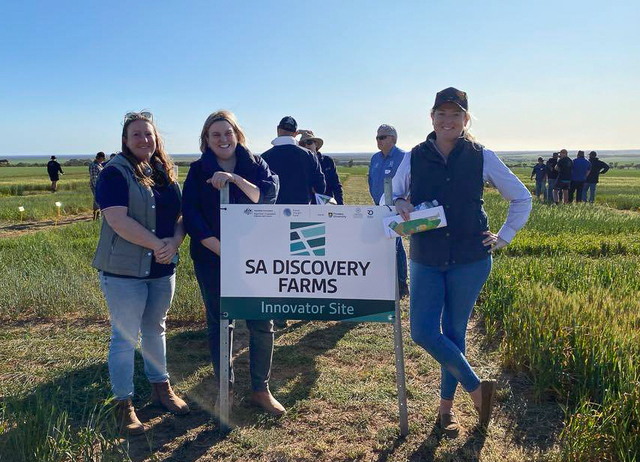Minnipa became home to one of four South Australian Discovery Farms established last year to test new climate resilience innovations in farming.
Led by Flinders University and delivered by the South Australian Research and Development Institute (SARDI) with 40 partners, the $8 million project also saw 35 Innovator Sites on commercial farming properties across South Australia established in the last 12 months, to directly engage with local farmers and advisers.
Flinders University affiliate Associate Professor and SARDI Agronomy Program leader Dr Rhiannon Schilling heads the program and said the long-term trial sites had been driven from the ground up with co-design meetings.
“The co-design process identified four key innovation themes – one: Tailor-made climate smart grain and feed; two: soil improvement practices to advance soil health; three: use of precision livestock strategies for healthier livestock; and four: Increasing landscape diversification,” she said.
“Mrs Zoe Starkey has been appointed as the long-term trials coordinator and brings extensive experience in facilitation and engagement in the agricultural industry.
“As a mixed farmer, Mrs Starkey has first-hand experience in managing a farming operation in dry conditions.”
Mrs Starkey said the trials were testing new climate resilience practices to give farmers the confidence to adopt these practices on their own properties.
“In the first year of the project, we have set up long-term trials investigating soil amelioration and additives, modifying the soil microbiome, virtual fencing, adapting pastures to dry conditions, moisture sensing seeding systems, herbicide safety and efficacy in varying rainfall as well as using plant genetics to build resilience,” she said.
“This year we’ll also be starting trials that look at landscape hydrology and remnant vegetation monitoring.”
Project stakeholders were being kept informed through newsletters, social media posts, website content updates, crop walks and presentations.
“Research innovations will align with key seasonal decisions that farmers have to make leading into and out of drought so they can make those decisions based on scientific data and rainfall decile,” Mrs Starkey said.
“We also aim to establish and strengthen networks between all our stakeholders to improve the ways we share knowledge and implement drought resilient practices and systems.
“Ultimately, the aim is to increase uptake of drought resilient innovations on-farm to improve economic, environmental and social resilience to drought.”
The SA Discovery Farms and Innovator sites link the project to farming systems in pastoral, low, medium, and high-rainfall zones across South Australia.








